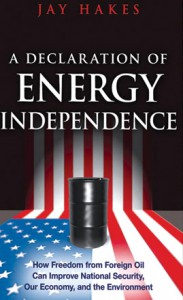A Voice interview with Jay Hakes, director of the Jimmy Carter Presidential Library, former head of the Energy Information Administration, and author of a new book: A Declaration of Energy Independence: How Freedom from Foreign Oil Can Improve National Security, Our Economy, and the Environment.
 Story by Bill Kovarik
Story by Bill KovarikThere is a moment in serious debate about any vital social question when the conversation turns from causes to solutions. Jay Hakes reflects that moment in the very structure of his book, turning from history and analysis in the first seven chapters to recommendations for governmental action in the next seven.
The book is a major contribution to the energy and environmental debate from one of the most knowledgeable and personable leaders in the nation.
Our interview took place in a comfortable office at the Jimmy Carter Presidential Library in Atlanta in late August. Hakes is impressive and yet friendly and unimposing, rather like the former president he serves in his current position.
The conversation ranged from the value of history to the challenge of this generation and to the potential for energy generation in the South. Among the main points Hakes stressed was the need to respect science and the related concept that there are no “silver bullets” or magic cures for energy woes.
Appalachian Voice: Your book shows the development of our current energy and environmental issues from what point in time?
Jay Hakes: I get interested in President Harry Truman. Under Truman, we’re fighting over offshore oil, natural gas price controls, nuclear reactors for navy submarines, and developing relationships with Saudi Arabia. Truman was also a supporter of synthetic fuels from coal.
I think what Gore and others do is they want to show a billion year context, and I think you lose a lot of readers that way. I start with the beginning of the industrial age.
AV: And how’s the reaction to your book?
JH: I did an interview on Georgia Tech radio last night, and students were just enthralled by this discussion. They ask, “Why don’t we know this? Why aren’t people talking about this?” Everywhere I’ve gone with this book, I’ve gotten larger than expected crowds.
AV: One of the things I loved was the recommendation for researchers to throw some “Hail Marys.”
JH: Some of the technologies, like algae, we may need to move out of the “Hail Mary” category into a pass that might be completed. I don’t believe in silver bullets, but if there was a silver bullet, that’s kind of the closest thing to it.
AV: Aquaculture and mariculture are tremendous untapped resources. Sounds far fetched today, but there is a lot to it.
JH: I saw a film clip that showed these algae refineries that have about 15 layers to them. [They] don’t take a lot of acreage, and [it] doesn’t take a lot of tweaking to get jet fuel or diesel fuel, which is the big gap with ethanol right now.
AV: What would be another book you’d like to write?
JH: I’d like to write about climate change, and explain why its different from other issues, and why you have to take an intergenerational approach to it, and help the layman get their minds around those concepts.
AV: Nearly everything you hear today (about climate change) was predicted in the 1970s, and there was a plan in place to accelerate renewable energy. Whatever happened to that? I know scientists who say we lost a generation of science on climate change and renewables.
JH: There’s an interesting story about this in the Reagan diaries. In the last month of Reagan’s presidency, in January of 1989, he notes in his diary: “Got report on climate change. Have to kill it. Costs too much.” So there you are – don’t tell me whether it’s true or not, it costs too much, so were going to bury it.
I think these historical stories have greater potential for educating the public about the issue than even trying to explain the science. Obviously, you have to do that too. Plato said, one way to ascertain truth is whether an idea has predictive power. You go back to those ‘70s reports {on climate change), and they say it’s going to start in the arctic areas, the oceans will buffer the effects for a while, but then there’s a potential for a reverse effect. All the things that people are saying today.
AV: History is a key to the entire thing. History traditionalizes and legitimizes our search for alternatives. Historian Lewis Mumford has a key concept we need to grasp—that the industrial revolution did not depend on fossil fuels. It was already well underway before coal and oil were used. So it would be great to start putting together an historical exhibit of renewable energy devices.
JH: The Carter White House had solar collectors, and you know the Carter farm had a windmill that was used to create water pressure. You ordered them from the Sears Roebuck catalog. I don’t know that they were able to find originals—the one at the Carter farm was a replica.Ethanol was a major innovation in the Carter administration [also]. What’s interesting from a historians standpoint is to not get too focused on the federal government. Nebraska was doing a lot.

And in Congress a lot of the muscle came from Birch Bahy of Indiana. Nebraska, Illinois, and Indiana were kind of out in front of Iowa in a way.
Ethanol had federal subsidies and it had state subsidies in the corn belt, whereas the solar credits were yanked away in 1986, and they didn’t have much state support. I’m arguing that in the southeast states, they should have tax breaks for cellulosic ethanol and not for grain ethanol, so that the
Southeast becomes the equivalent of the corn belt for cellulosic ethanol. I think that makes a lot of sense as an economic development strategy. Why a state should be granting credits for corn-based ethanol, I don’t understand.
Carter was told about the Brazilian efforts. Also another interesting memo in our records, where the Council of Economic Advisors said grain based ethanol doesn’t produce much benefit and the money should be spent on non-grain ethanol research..
I had an article on a website called Renewable Energy World—argued that there were four basic ways to support renewables through federal policy.
To me, the least attractive was tax incentives and credits, because it is so hard under existing budget rules to put them in for a long enough time that they really provide a good price signal . The political attention should be devoted to raising the tax on carbon fuels which does the same thing and will be permanent and therefore create a much better investment climate.
What the strategy ought to be in Washington, if we’re going to be politically realistic, is to say OK, we’re going to put those tax credits in for wind and solar, but it could be contingent that it would go away when you get cap and trade or fossil fuel taxes. I think that would make the congress feel more comfortable about the whole enterprise. It’s also a way to transition to cap and trade.
Then, I would say throw away all these other expensive incentives and just renew the solar and wind tax credits. There’s always been a virtual promise that these were going to be extended. I think the creditiblity of the federal government is on the line here. But, if you look at the Gang of 10, they’re just throwing tax credits around everywhere. If you have tax incentives to all the fuels, which then cancel each other out in terms of balance, what have you got from a policy standpoint?
AV: ...a way to drain money from the taxpayers?
JH: Right. If the politics of this is played right, you could get some of the conservative groups to say it would be more honest to tax carbon as an external cost than it is to throw all these tax incentives. Think back to an age when we finally decided that we couldn’t let horses drop manure in the street. At a certain point in history that was acceptable, and at another point it wasn’t acceptable. If we had that problem today, we’d say we had to give these horse owners tax credits. We couldn’t just tell they they had to clean up their mess.
We have put ourselves in this thought – how we deal with issues today is virtually ineffective, because we can’t talk about any sticks, it’s only carrots. If we can’t get out of that mindset, we’re just wasting our time.
AV: Southeast as a center of innovation for cellulosic ethanol would depend on the technologies that Range Fuels are developing, Auburn University …
JH: University of Florida is doing a lot, Georgia Tech, and North Carolina State are doing a lot. You have a lot of people in Georgia who know a lot about pine trees, you have the Nicholas School at Duke.
On the negative side, we’ve had Southern Co., which along with Exxon, was one of the companies that worked hardest to defeat the renewable portfolio standard (RPS), and the argument that they used, they convinced all the southern representatives, that the South didn’t have good renewable resources. So this was what was penalizing the South. Well, if you look at the EIA study on RPS, one is it doesn’t raise prices, and two, biomass is the major beneficiary.
AV: And if you look at the Department of Energy “billion ton” study the South is a major source of biomass.
JH: Congress rejected the RPS because of a rationale that was based on false logic.
AV: Some wildlife groups are very enthusiastic about seasonal crops like switchgrass or miscanthus, which can enhance hunting.
JH: I hadn’t thought of that, but it might be the winning argument.

 And in Congress a lot of the muscle came from Birch Bahy of Indiana. Nebraska, Illinois, and Indiana were kind of out in front of Iowa in a way.
And in Congress a lot of the muscle came from Birch Bahy of Indiana. Nebraska, Illinois, and Indiana were kind of out in front of Iowa in a way.